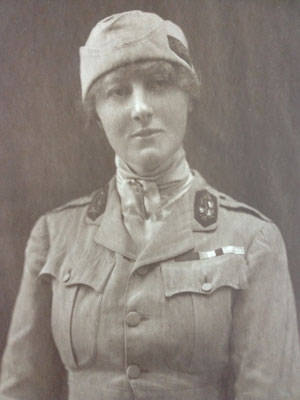Lady Isabel Hutton 1887-1960
Pioneer in the treatment of mental disorders brought about by war
Isabel Galloway Emslie was born and brought up in Edinburgh, qualifying in medicine in 1910 and then specialising in the study of mental and nervous disorders. She was the first woman physician at the Royal Mental Hospital in Morningside.
Six months after the outbreak of the First World War she joined the Scottish Women's Hospitals, a voluntary organisation pioneered by her older colleague Elsie Inglis, whose offer to help the British Army had been so patronisingly refused by the War office. The Allies however were quick to welcome the SWH and Isabel was first posted to France, then to Salonika and Serbia where she ran field hospitals, undertaking surgical operations in difficult conditions. She was acutely aware of the irony of the situation Scottish women doctors faced; when on the Serbian frontier she noted in her journal:
How strange are the fortunes of war! Here was a Scottish Women's Hospital attached to a French Expeditionary Force, while side by side with us were men of a British division without a hospital...I could not help dwelling bitterly upon the refusal of the Scottish women's offer to succour their own kinsmen.
It was not until 1918 that she finally was able to help British soldiers (British Transport Company personnel working with the Serbian Army) after a request from a British Royal Army Medical Corps Colonel. In her autobiography she registers the delight she and her colleagues felt to at last have the opportunity of service to fellow countrymen.
In recognition of her services, Isabel was awarded the Order of the White Eagle, Serbia’s highest award. She also received the Order of St Sava of Serbia, the Royal Red Cross, Serbia, the Croix de Guerre, (France) and the Order of St Anne of Russia.
Isabel was first and foremost interesting in healing people, no matter what their creed or nationality. After the war ended she found herself answering a call for doctors to join Lady Muriel Paget's Mission for Children in the Crimea, which she eventually ran. During the Evacuation of Crimea the British had orders to give no official aid to Russian refugees, a command she managed to ignore: Was it not our bounden duty to help all refugees, whether they were 'Whites' or 'Reds'?
When her mission work came to an end, she spent time furthering her psychiatric studies in Vienna, then returned to Edinburgh to resume her treatment of mental disorders. However, she was soon forced to resign her post: she had fallen in love with and married an English Army Major, Tom Hutton. At the time, married women could not pursue a career. Her husband lived and worked at the Army Staff College in Camberley joining Isabel for weekends and holidays in London. She studied the mental effects of war at the Maudsley Hospital and was soon invited to join the staff, but the offer was withdrawn when it was learned she was a married woman.
She had to forego many jobs for which she was eminently qualified, instead concentrating on building up a private consulting practice specialising in mental disorders. At the same time, she wrote a simple and practical guide for young married couples on the subject of sex education, The Hygiene of Marriage. This was still strictly taboo and she was advised by many against publication. It went through many editions even though it was never reviewed or advertised. Isabel wrote many other books including The Last of the Taboos – Mental Disorders in Modern Life, Women's Change of Life and her biographies.
Isabel had posts as Honorary Psychiatrist in the Maudsley Hospital, the West End Hospital for Nervous Diseases, and at the British Hospital for Mental and Nervous Disorders, where she worked for over thirty years. The latter was the first hospital in Britain with an Outpatients' Department for patients with mental disorders. In 1926 she was asked to take over the Ellen Terry Home for blind 'defective' children founded by Theosophists.
She accompanied her husband to India when he was appointed Major-General in Quetta, and then Chief of Staff in Simla, where she became Director of the Red Cross Welfare Service. She met Ghandi and was impressed by his kindness and homely manner.
She always had a passionate love of dance. In Sebastopol she had exchanged informal lessons with the dancing master of the Bolshoi Ballet: he taught her a court dance Boyarski (which she later saw performed by Pavlova) and she in turn taught him the Highland Fling and the Sword Dance. She had seen soldiers in Serbia dance, and described her exhilaration at seeing Pathans dance Bangra and Balbala. Watching these dances I felt...that dancing was originally a male preserve and a warlike accomplishment...
Her artistic side was given expression in India when she broadcast on opera, ballet, and the lives of composers. She became the music critic on a main Indian paper, The Statesman.
She and her husband eventually returned to London in 1946 where she lived until her death in 1960.
Barbara McLean
Sources:
Hutton, I Emslie. With a Women's Unit in Serbia, Salonika and Sebastopol. London: Williams and Norgate Ltd., 1928.
Hutton, Isabel. Memories of a Doctor in War and Peace. London: William Heinemann, 1960.

